Vinphonic
10-03-2017, 03:08 PM
The Legacy of Japanese Composers
Toshihiko Sahashi
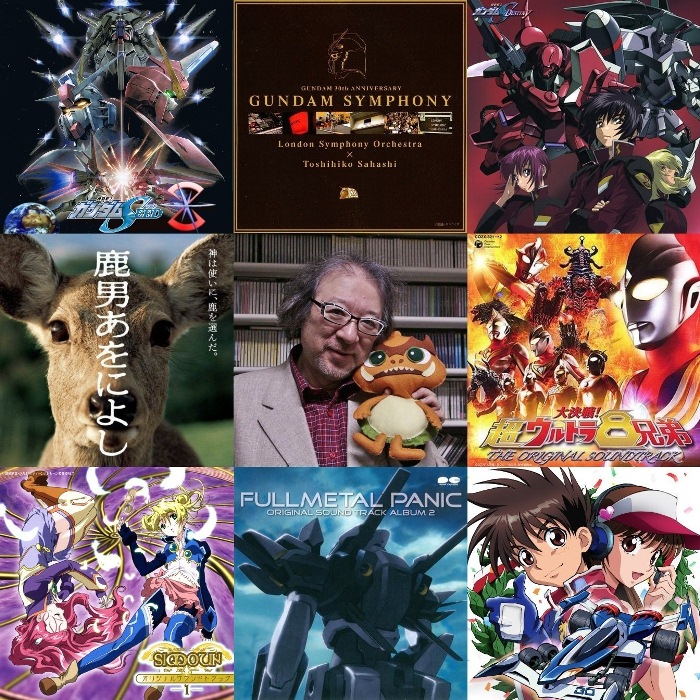
Oh Toshihiko Sahashi… one of the best composers working right now and also a pretty underrated and unrecognized musical talent in the grand scheme of things. Almost no one else can put the same amount of unadulterated fun in his music like Sahashi can. Granted, he is by no means the greatest master of orchestral music but he seems to have absorbed the best qualities of the classical world, the film music world and pop world (Funk/Jazz/Rock) to combine them all into an unrivaled aural spectacle while NEVER coming across as a thief. It’s more like he really has absorbed the qualities of Mozart rather than just quoting him. He also has vast knowledge of film music as well as TV scores of the 70s and incorporates that into his own style like nobody’s business: Giant Monster attacks a city… Ifukube it is! Heroic march… Williams of course! Giant space ship sails through the stars… no one else but Jerry! Drama in Italy… Morricone! Training Montage… Conti! But in contrast to Amano none of it feels traced, it all comes across as natural in the context of the score. It’s also not unusual for him to combine his symphonic sensibilities, his love for film music and his affection for Funk/Jazz/Rock in the same piece of music for a truly remarkable listening experience.
If you have never heard of him, chances are high that you’ve listened to his arrangements at least. His Deep Purple Medley is perhaps his most famous around the world. It’s performed quite frequently, even in Germany to this day on various band festivals. It’s quite interesting how similar his career is to Hollywood legend John Williams in some aspects, a journey from a small Jazz/Rock band “Kenso” to the London Symphony Orchestra. He was also a very prolific composer until recently. In comparison to Tanaka, Kanno and Amano he was a lot more active. During his peak in the late 2000s we were blessed with numerous scores I would call great film scores, among those fantastic SciFi scores performed by none other than the London Symphony Orchestra.
Unfortunately everything else he masterfully scored was only performed by a local Japanese studio orchestra (small and big). Granted it is not bad sounding by any means but his music would have had even more power and grace with a world class ensemble. The only fault you can find with him is that he has a certain comfort zone of rhythms, harmonies and melodies that he falls back on frequently and that can be a bit repetitive at times but he never evokes the same reaction I get with Horner and Amano, far from it. Nonetheless he has his own little variation of a “Danger motif”, as well as standard blueprints for military action. Nevertheless, let’s dive in into his large body of work and highlight his most accomplished efforts.
Part I - Toshihiko's Gundam

I would argue that Gundam was at its peak (musically) when Sahashi took over with SEED and SEED Destiny. What he wrote are hours upon hours of great SciFi music very much in the sound world of Williams and Goldsmith. In total over 6 hours of score and almost no boring and wasted minute. It’s all pretty much spectacle where we can hear Sahashi at his very best as an orchestral composer, a band musician and as a songwriter. Thankfully the shows were very popular in Japan and as a result he was given the opportunity to record a symphonic arrangement of his scores with the best orchestra in the world. His two London symphonic albums are just unbelievable. They’re fantastic symphonic scores that pay more than one visit to the sound world of the legendary Hollywood trio, even more evident than in the series. Two of the greatest SciFi scores ever recorded. He even got a third chance to go to London to record his arrangements of famous Gundam songs in 2009. For all intends and purposes this is Sahashi at his absolute peak. What he does with his arrangements of popular Gundam songs is just out of this world. A beautiful fusion of classical music and film music. His final piece “The Symphony” is one of my favorite Sahashi pieces and a giant love letter to Hollywood. His three London Symphonies should be in anyone’s collection. Three of the greatest orchestral albums of the past decade.
Now moving on to his scores for TV-Anime in the 2000s.
Part II - The Era of Sahashi (2000 - 2009)


SIMOUN: A masterpiece. It has everything. A homage to Mozart, beautiful Latin and folk inspired dances, a Vangelis homage, late romantic pastoral orchestral pieces and classical waltzes. Two major themes dominate the score: A feisty and eccentric theme, most prominent in the Tango and a romantic and regal theme, most prominent in the classical waltz. The fusion of synth, sax and orchestra is just out of this world.
Steel Angel Kurumi: A beautiful orchestral romantic fantasy with delightful string pieces. His most gentle work and a great example of the beauty of cello and harp. At the end he even pulls a Goldsmith with a full five minute symphonic piece with incorporation of the Main Theme. His songs are also incredibly cute and catchy. A must listen.
Element Hunters: A surprise bag full of everything that makes Sahashi great. Kickass Jass & Rock pieces, great orchestral pieces with more than one homage to Goldsmith and Conti. He even evokes Mozart at the end for a little operatic climax. Love it!
King of Thorn: Sahashi wrote one of the most unique and soul touchingly beautiful scores of his career and no soundtrack of the film was ever released. The few pieces who are SFX free are not even the best stuff in the film. What I would give for a soundtrack release.
Gunslinger Girl: His most tragic score, operatic with winks to Morricone, Bach and Mozart.
The Big-O: A great noir-style score full of funky moments as well as moments of orchestral grandeur. Guest appearance by Ifukube, Beethoven and Claude Joseph Rouget de Lisle.
Full Metal Panic: A blast from the past with the iconic A-Team and friends with flavors of 70s Williams and 90s Goldsmith. Great military score.
Hitman Reborn: Rocky – Take 5… with British spy movie flair of the 60s and a little Bach & Mozart.
Soul of Gold: I've included it because it's his only recent score that has the same vigor and quality as his anime scores from the 2000s. An all-around excellent return to form.
I've also distributed various scores among others that fit thematically because on their own there's not much substantial orchestral stuff for a full album.
Onto his earlier work in the 90s:
Part III - 90s Pomp & 80s Funk

Some of his earlier works have been collaborations with equally if not more talented composers such as Asakawa and Oshima and it’s also in this period where we can hear his band influence the strongest.
Future GPX is my favorite from this period, it’s just great fun to listen to it, a killer theme, full of funk and jazz. But not devoid of classic film score either, and a fantastic danger theme as well that would later evolve into his Spaceship Minerva for Gundam SEED Destiny. It also links the two periods together as he scored the sequel in 2000. With Garou Densetsu Sahashi did go full Hollywood for the first time. Delivering a mix of Golden Age sound, Jazz, Funk and Goldsmith. Blue Stinger has a fantastic Williams-grade concert piece that cements Sahashi's ability to score like the Hollywood greats.
Angel Links is a precursor to his greatest hits in the 2000s. We can already hear Sahashi’s tasty mix of various scoring styles. And the first most prominent appearance of his trademark soprano vocals.
And I’m head over heels for some of the pieces he wrote during this time, Izumi the Priest from Ryu Knight being a prime example.
About TV-Drama:
Part IV - The Romantic Drama
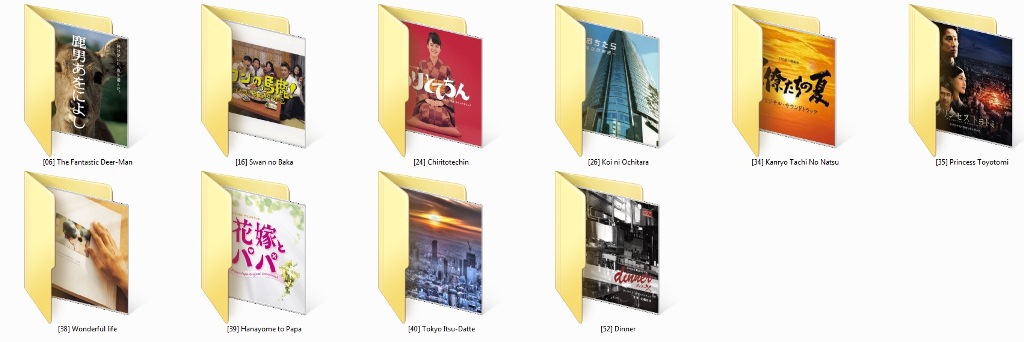
The Fantastic Deer-man is an awesome thematic superhero film score written for a TV comedy. Symphonic in nature and with much concert grade pieces. One of his very best.
Swan no Baka, fantastic introspective score full of romanticism and smooth sensual jazz.
Chiritotechin is a beautiful classical driven pastoral score with a few nods to Italian film flair (think La Vita � Bella or Morricone’s catalogue).
Koi ni Oshitara is more a collage of great Hollywood moments than a cohesive score but the main theme is a killer and great Hollywood moments are still great Hollywood moments. I’m still not sure if Sahashi based his piece Frontier more on Tchaikovsky’s Violin Concerto or Bill’Conti’s The Right Stuff.
About his Tokusatsu scores:
Part V - Toshihiko's Tokusatsu

The Super 8 Ultra Brothers remains my favorite Tokusatsu score of his, it doesn’t get more epic than this one. Kind of what the Avengers should have sounded like. A great Superhero score all around, again with two major themes, one bold and heroic theme to lift up your spirit and a lofty and encouraging theme to make you fly. I really think Sahashi takes after Horner’s philosophy of a maximum of three primary themes in a film score, two being the ideal.
From all the Ultraman TV scores I think Gaia takes the spotlight. Like Mebius it’s full of western references like Top Gun but also manages to incorporate quite a lot of classic Hollywood style. For the Gaia movie he even incorporates previous famous Ultraman themes for a rousing climax. His “Battle in Hyperspace theme” as well as his “Photon power theme” being an excellent fun ride. Also some trivia: Mitsuda's NHK Comet Theme sounds suspiciously similar to Sahashi's "Ties of Friendship" from Mebius. Ultra Daikaiju Battle is for all intends and purposes a classic SciFi score where Sahashi’s trademarks appear much stronger than usual.
I personally adore his Gingaman score but objectively speaking it’s not among his best, although there are quite a few stellar orchestral pieces among the wacky and funky ride.
I’m not that positive of his Kamen Rider scores, but Agito takes the cake with its operatic nature, a direct homage to Goldsmith’s Omen, Silvestri’s Back to the Future and Italian Opera.
The Melodic Craftsmanship of Toshihiko Sahashi
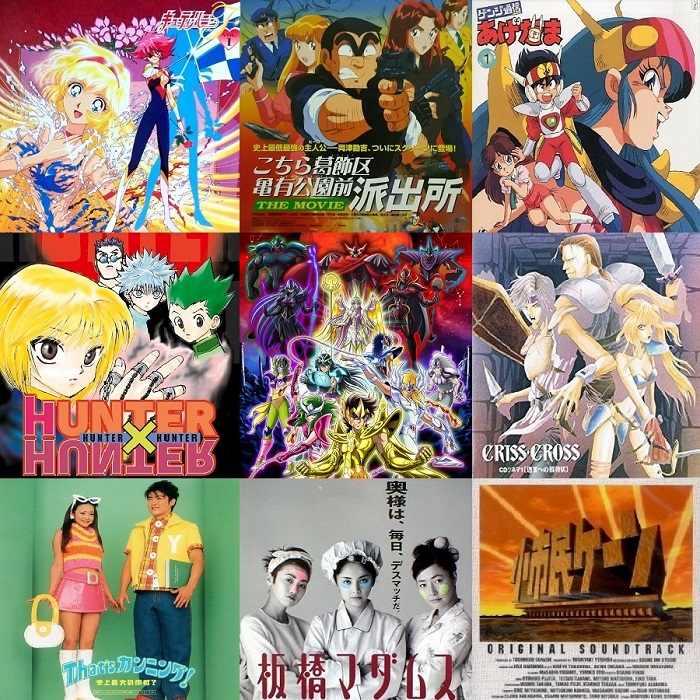
Sample (https://www.youtube.com/watch?v=O_mSs4PC0iY)
Download (https://mega.nz/#!7HgCCaCI!p7B-JgDS92IcGWp-d-vbIyXjC37wx85MqGSnfOcUAzk)
Just like I did for King Tanaka, here's the appendix of Sahashi's melodic outburst in the 90s. Ive worked on each album to make it cohesive and cut off the fat even further. I've also thrown in the highlights of Saint Seiya Omega for good measure, now covering everything of note he has done from 1991 to 2019. This is only possible because of Bladelight, so give him a big rep, all credit belongs to him (and nextday for Sahashi's little string album). The highlight is of course the three Live-action projects he worked on in the late 90s. In 1999 he truely entered stardom: Angel Links, Ultraman Gaia, Kochikame Movie, Blue Stinger, Itabashi Madams, Small Citizen Kane, Big-O, HunterXHunter etc. Ten years of glory, ending with the Gundam Symphony. An incredibly prolific composer, just like Goldsmith. So much melody... and you know, that tends to last, just ask Mozart.
Composer Profile: Toshihiko Sahashi
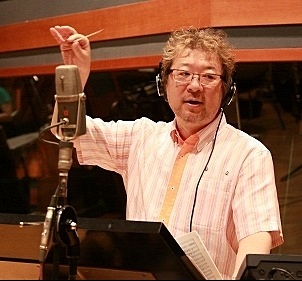
Trademark: King of Funk, Jerry’s long lost brother, Little Mozart
Inspiration: Classical Repertoire, Hollywood Legacy, various 70s and 80s band work
Music Education: Tōkyō Geijutsu Daigaku, Piano Player, Songwriter
Worked with notable Orchestras: London Symphony Orchestra
Most known work: Gundam SEED, Gundam SEED Destiny
Melodic Sense: Excellent
LINK IN DESCRIPTION (https://mega.nz/#!IvoH1IRB!ockwuN-0ilJ1JR3Ecn-AgAoolc_FMpNCZUi5OdQalsk)
New releases:
FULLMETAL PANIC! The Complete Orchestral Score (2001~2018)
Studio Orchestra
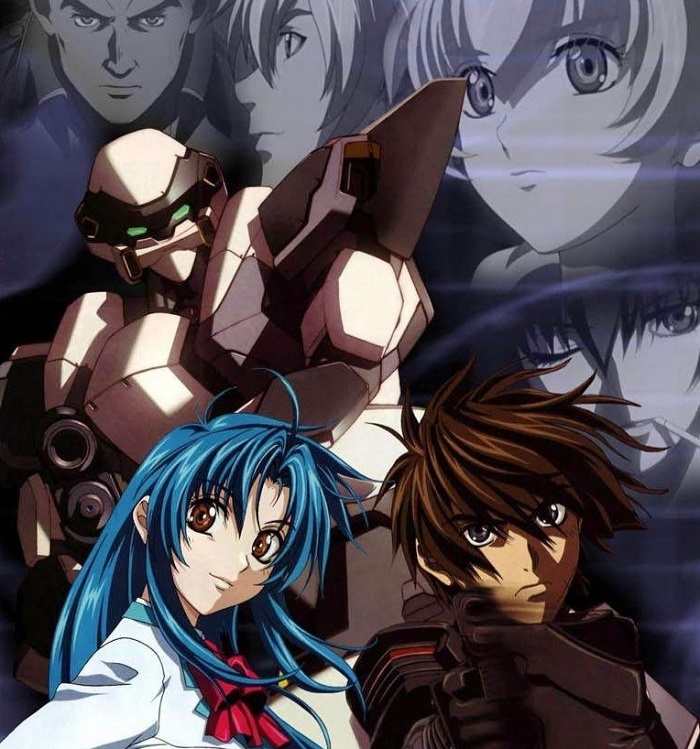
Sample (http://picosong.com/w9mMu/)
DOWNLOAD (https://mega.nz/#!M3IDQSKb!7s7t-2mT4yoDnpqhyltsiuVRXUeXBPfl-DnXRoVxZaM)
The orchestral/brass pieces from all the soundtracks including Invisible Victory. The new score provides some much needed Leitmotif to the other material and his action while using modern audio tools ala action-thriller (appropiate for FMP) is as good as ever. Excellent writing all-around and highly energetic. It's so good to hear him again. His cue Up to now killed me, that Descant Horn statement of the A-Team followed by pure fullblown 80s :D
SAINT SEIYA: Saintia Shō
Sound Inn Studio Orchestra / Soprano: Nataliya Gudziy / Trumpet: Eric Miyashiro

How much have I missed this music... ah... Anime was not the same without it! (https://picosong.com/wmuZx/)
Download (https://mega.nz/#!KLQHnCDB!bzAJWgFJzu19hGwu0B0LntH__KKDRAq593heGs258eo)
FLAC / 44 Tracks / 87min
Ripped from my cd. The tracks were rather thrown on the cds without much reason so I put them together for a much better flow and listening experience.
This is a cross between Gundam SEED and Ultraman Mebius + a little Soul of Gold. A couple of cues had no live-recording, which is not earth-shaking and actually takes me back to his Ultraman and early anime works and the best stuff and most of it is live but it could have been better if all was recorded live. On the other hand, yey, its Gundam Seed (especially track 1, 36 and 40) so just enjoy the ride (There is also a reprise of a classic theme ;)).

While preserving the classical world, we will incorporate contemporary technology and update it, creating a new style of music that will succeed it, “Anime-style”. That's something I've been thinking about a lot in recent years, and as long as I'm making music of the "Saint Seiya" series I will continue to do so. Saintia in particular is a work that is such great fun.
I would like to make music suitable for more modern animation so I will be more active from now on. Actually I want to record in London again, with a pipe organ this time.
Please look forward to the soundtrack release for Saint Seiya Saintia Sho and I hope you will have as much fun listening as I had making it.
- Toshihiko Sahashi (11.12.2018)
Toshihiko Sahashi

Oh Toshihiko Sahashi… one of the best composers working right now and also a pretty underrated and unrecognized musical talent in the grand scheme of things. Almost no one else can put the same amount of unadulterated fun in his music like Sahashi can. Granted, he is by no means the greatest master of orchestral music but he seems to have absorbed the best qualities of the classical world, the film music world and pop world (Funk/Jazz/Rock) to combine them all into an unrivaled aural spectacle while NEVER coming across as a thief. It’s more like he really has absorbed the qualities of Mozart rather than just quoting him. He also has vast knowledge of film music as well as TV scores of the 70s and incorporates that into his own style like nobody’s business: Giant Monster attacks a city… Ifukube it is! Heroic march… Williams of course! Giant space ship sails through the stars… no one else but Jerry! Drama in Italy… Morricone! Training Montage… Conti! But in contrast to Amano none of it feels traced, it all comes across as natural in the context of the score. It’s also not unusual for him to combine his symphonic sensibilities, his love for film music and his affection for Funk/Jazz/Rock in the same piece of music for a truly remarkable listening experience.
If you have never heard of him, chances are high that you’ve listened to his arrangements at least. His Deep Purple Medley is perhaps his most famous around the world. It’s performed quite frequently, even in Germany to this day on various band festivals. It’s quite interesting how similar his career is to Hollywood legend John Williams in some aspects, a journey from a small Jazz/Rock band “Kenso” to the London Symphony Orchestra. He was also a very prolific composer until recently. In comparison to Tanaka, Kanno and Amano he was a lot more active. During his peak in the late 2000s we were blessed with numerous scores I would call great film scores, among those fantastic SciFi scores performed by none other than the London Symphony Orchestra.
Unfortunately everything else he masterfully scored was only performed by a local Japanese studio orchestra (small and big). Granted it is not bad sounding by any means but his music would have had even more power and grace with a world class ensemble. The only fault you can find with him is that he has a certain comfort zone of rhythms, harmonies and melodies that he falls back on frequently and that can be a bit repetitive at times but he never evokes the same reaction I get with Horner and Amano, far from it. Nonetheless he has his own little variation of a “Danger motif”, as well as standard blueprints for military action. Nevertheless, let’s dive in into his large body of work and highlight his most accomplished efforts.
Part I - Toshihiko's Gundam

I would argue that Gundam was at its peak (musically) when Sahashi took over with SEED and SEED Destiny. What he wrote are hours upon hours of great SciFi music very much in the sound world of Williams and Goldsmith. In total over 6 hours of score and almost no boring and wasted minute. It’s all pretty much spectacle where we can hear Sahashi at his very best as an orchestral composer, a band musician and as a songwriter. Thankfully the shows were very popular in Japan and as a result he was given the opportunity to record a symphonic arrangement of his scores with the best orchestra in the world. His two London symphonic albums are just unbelievable. They’re fantastic symphonic scores that pay more than one visit to the sound world of the legendary Hollywood trio, even more evident than in the series. Two of the greatest SciFi scores ever recorded. He even got a third chance to go to London to record his arrangements of famous Gundam songs in 2009. For all intends and purposes this is Sahashi at his absolute peak. What he does with his arrangements of popular Gundam songs is just out of this world. A beautiful fusion of classical music and film music. His final piece “The Symphony” is one of my favorite Sahashi pieces and a giant love letter to Hollywood. His three London Symphonies should be in anyone’s collection. Three of the greatest orchestral albums of the past decade.
Now moving on to his scores for TV-Anime in the 2000s.
Part II - The Era of Sahashi (2000 - 2009)


SIMOUN: A masterpiece. It has everything. A homage to Mozart, beautiful Latin and folk inspired dances, a Vangelis homage, late romantic pastoral orchestral pieces and classical waltzes. Two major themes dominate the score: A feisty and eccentric theme, most prominent in the Tango and a romantic and regal theme, most prominent in the classical waltz. The fusion of synth, sax and orchestra is just out of this world.
Steel Angel Kurumi: A beautiful orchestral romantic fantasy with delightful string pieces. His most gentle work and a great example of the beauty of cello and harp. At the end he even pulls a Goldsmith with a full five minute symphonic piece with incorporation of the Main Theme. His songs are also incredibly cute and catchy. A must listen.
Element Hunters: A surprise bag full of everything that makes Sahashi great. Kickass Jass & Rock pieces, great orchestral pieces with more than one homage to Goldsmith and Conti. He even evokes Mozart at the end for a little operatic climax. Love it!
King of Thorn: Sahashi wrote one of the most unique and soul touchingly beautiful scores of his career and no soundtrack of the film was ever released. The few pieces who are SFX free are not even the best stuff in the film. What I would give for a soundtrack release.
Gunslinger Girl: His most tragic score, operatic with winks to Morricone, Bach and Mozart.
The Big-O: A great noir-style score full of funky moments as well as moments of orchestral grandeur. Guest appearance by Ifukube, Beethoven and Claude Joseph Rouget de Lisle.
Full Metal Panic: A blast from the past with the iconic A-Team and friends with flavors of 70s Williams and 90s Goldsmith. Great military score.
Hitman Reborn: Rocky – Take 5… with British spy movie flair of the 60s and a little Bach & Mozart.
Soul of Gold: I've included it because it's his only recent score that has the same vigor and quality as his anime scores from the 2000s. An all-around excellent return to form.
I've also distributed various scores among others that fit thematically because on their own there's not much substantial orchestral stuff for a full album.
Onto his earlier work in the 90s:
Part III - 90s Pomp & 80s Funk

Some of his earlier works have been collaborations with equally if not more talented composers such as Asakawa and Oshima and it’s also in this period where we can hear his band influence the strongest.
Future GPX is my favorite from this period, it’s just great fun to listen to it, a killer theme, full of funk and jazz. But not devoid of classic film score either, and a fantastic danger theme as well that would later evolve into his Spaceship Minerva for Gundam SEED Destiny. It also links the two periods together as he scored the sequel in 2000. With Garou Densetsu Sahashi did go full Hollywood for the first time. Delivering a mix of Golden Age sound, Jazz, Funk and Goldsmith. Blue Stinger has a fantastic Williams-grade concert piece that cements Sahashi's ability to score like the Hollywood greats.
Angel Links is a precursor to his greatest hits in the 2000s. We can already hear Sahashi’s tasty mix of various scoring styles. And the first most prominent appearance of his trademark soprano vocals.
And I’m head over heels for some of the pieces he wrote during this time, Izumi the Priest from Ryu Knight being a prime example.
About TV-Drama:
Part IV - The Romantic Drama

The Fantastic Deer-man is an awesome thematic superhero film score written for a TV comedy. Symphonic in nature and with much concert grade pieces. One of his very best.
Swan no Baka, fantastic introspective score full of romanticism and smooth sensual jazz.
Chiritotechin is a beautiful classical driven pastoral score with a few nods to Italian film flair (think La Vita � Bella or Morricone’s catalogue).
Koi ni Oshitara is more a collage of great Hollywood moments than a cohesive score but the main theme is a killer and great Hollywood moments are still great Hollywood moments. I’m still not sure if Sahashi based his piece Frontier more on Tchaikovsky’s Violin Concerto or Bill’Conti’s The Right Stuff.
About his Tokusatsu scores:
Part V - Toshihiko's Tokusatsu

The Super 8 Ultra Brothers remains my favorite Tokusatsu score of his, it doesn’t get more epic than this one. Kind of what the Avengers should have sounded like. A great Superhero score all around, again with two major themes, one bold and heroic theme to lift up your spirit and a lofty and encouraging theme to make you fly. I really think Sahashi takes after Horner’s philosophy of a maximum of three primary themes in a film score, two being the ideal.
From all the Ultraman TV scores I think Gaia takes the spotlight. Like Mebius it’s full of western references like Top Gun but also manages to incorporate quite a lot of classic Hollywood style. For the Gaia movie he even incorporates previous famous Ultraman themes for a rousing climax. His “Battle in Hyperspace theme” as well as his “Photon power theme” being an excellent fun ride. Also some trivia: Mitsuda's NHK Comet Theme sounds suspiciously similar to Sahashi's "Ties of Friendship" from Mebius. Ultra Daikaiju Battle is for all intends and purposes a classic SciFi score where Sahashi’s trademarks appear much stronger than usual.
I personally adore his Gingaman score but objectively speaking it’s not among his best, although there are quite a few stellar orchestral pieces among the wacky and funky ride.
I’m not that positive of his Kamen Rider scores, but Agito takes the cake with its operatic nature, a direct homage to Goldsmith’s Omen, Silvestri’s Back to the Future and Italian Opera.
The Melodic Craftsmanship of Toshihiko Sahashi

Sample (https://www.youtube.com/watch?v=O_mSs4PC0iY)
Download (https://mega.nz/#!7HgCCaCI!p7B-JgDS92IcGWp-d-vbIyXjC37wx85MqGSnfOcUAzk)
Just like I did for King Tanaka, here's the appendix of Sahashi's melodic outburst in the 90s. Ive worked on each album to make it cohesive and cut off the fat even further. I've also thrown in the highlights of Saint Seiya Omega for good measure, now covering everything of note he has done from 1991 to 2019. This is only possible because of Bladelight, so give him a big rep, all credit belongs to him (and nextday for Sahashi's little string album). The highlight is of course the three Live-action projects he worked on in the late 90s. In 1999 he truely entered stardom: Angel Links, Ultraman Gaia, Kochikame Movie, Blue Stinger, Itabashi Madams, Small Citizen Kane, Big-O, HunterXHunter etc. Ten years of glory, ending with the Gundam Symphony. An incredibly prolific composer, just like Goldsmith. So much melody... and you know, that tends to last, just ask Mozart.
Composer Profile: Toshihiko Sahashi

Trademark: King of Funk, Jerry’s long lost brother, Little Mozart
Inspiration: Classical Repertoire, Hollywood Legacy, various 70s and 80s band work
Music Education: Tōkyō Geijutsu Daigaku, Piano Player, Songwriter
Worked with notable Orchestras: London Symphony Orchestra
Most known work: Gundam SEED, Gundam SEED Destiny
Melodic Sense: Excellent
LINK IN DESCRIPTION (https://mega.nz/#!IvoH1IRB!ockwuN-0ilJ1JR3Ecn-AgAoolc_FMpNCZUi5OdQalsk)
New releases:
FULLMETAL PANIC! The Complete Orchestral Score (2001~2018)
Studio Orchestra

Sample (http://picosong.com/w9mMu/)
DOWNLOAD (https://mega.nz/#!M3IDQSKb!7s7t-2mT4yoDnpqhyltsiuVRXUeXBPfl-DnXRoVxZaM)
The orchestral/brass pieces from all the soundtracks including Invisible Victory. The new score provides some much needed Leitmotif to the other material and his action while using modern audio tools ala action-thriller (appropiate for FMP) is as good as ever. Excellent writing all-around and highly energetic. It's so good to hear him again. His cue Up to now killed me, that Descant Horn statement of the A-Team followed by pure fullblown 80s :D
SAINT SEIYA: Saintia Shō
Sound Inn Studio Orchestra / Soprano: Nataliya Gudziy / Trumpet: Eric Miyashiro

How much have I missed this music... ah... Anime was not the same without it! (https://picosong.com/wmuZx/)
Download (https://mega.nz/#!KLQHnCDB!bzAJWgFJzu19hGwu0B0LntH__KKDRAq593heGs258eo)
FLAC / 44 Tracks / 87min
Ripped from my cd. The tracks were rather thrown on the cds without much reason so I put them together for a much better flow and listening experience.
This is a cross between Gundam SEED and Ultraman Mebius + a little Soul of Gold. A couple of cues had no live-recording, which is not earth-shaking and actually takes me back to his Ultraman and early anime works and the best stuff and most of it is live but it could have been better if all was recorded live. On the other hand, yey, its Gundam Seed (especially track 1, 36 and 40) so just enjoy the ride (There is also a reprise of a classic theme ;)).

While preserving the classical world, we will incorporate contemporary technology and update it, creating a new style of music that will succeed it, “Anime-style”. That's something I've been thinking about a lot in recent years, and as long as I'm making music of the "Saint Seiya" series I will continue to do so. Saintia in particular is a work that is such great fun.
I would like to make music suitable for more modern animation so I will be more active from now on. Actually I want to record in London again, with a pipe organ this time.
Please look forward to the soundtrack release for Saint Seiya Saintia Sho and I hope you will have as much fun listening as I had making it.
- Toshihiko Sahashi (11.12.2018)